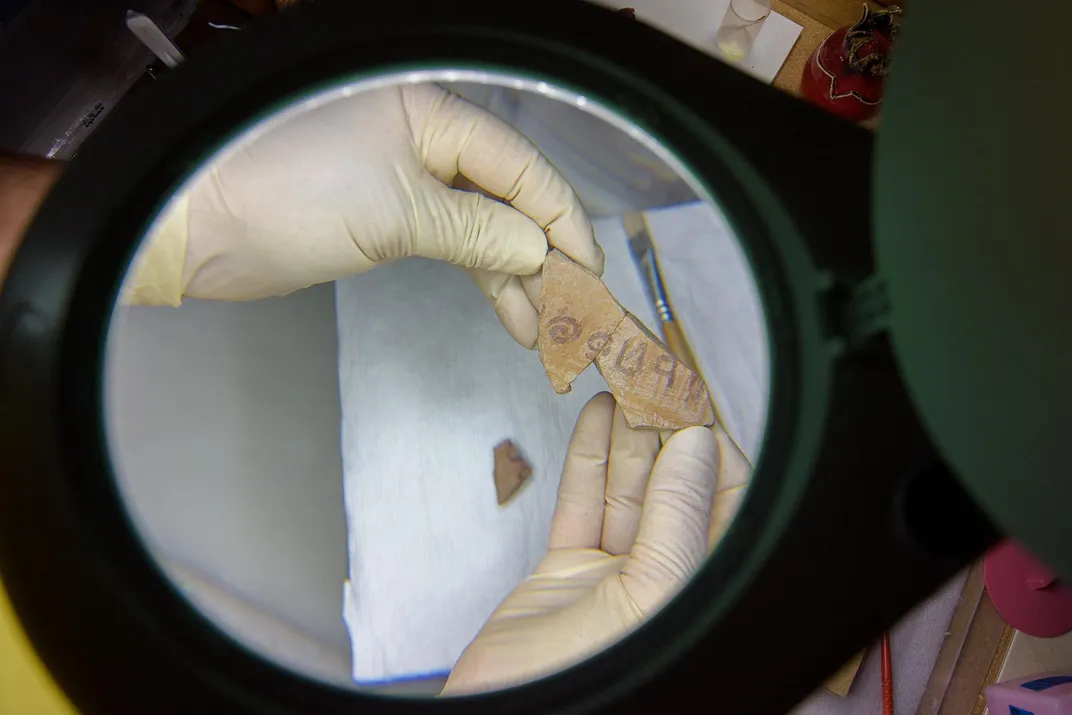This 3,100-Year-Old Inscription May Be Linked to a Biblical Judge
A pottery fragment found in Israel bears the name Jerubbaal—a nickname for Gideon ben Yoash, who appears in the Book of Judges
/https://tf-cmsv2-smithsonianmag-media.s3.amazonaws.com/filer/ea/cd/eacd12db-b533-4f78-944c-4b404eb3aa8f/thisisa_jjug.png)
Archaeologists in southern Israel have found a 3,100-year-old fragment of a jug with five letters written in ink that appear to represent the name Jerubbaal, or Yeruba’al.
In the biblical Book of Judges, the name Jerubbaal is used as a nickname for the judge—or leader—Gideon ben Yoash, reports Rossella Tercatin for the Jerusalem Post. The team is unsure whether a connection between the writing and the biblical figure exists but says this is the first time the name has been recorded outside of the text.
The researchers found the pot at an archaeological site in the Shahariya Forest in the Judean Foothills in 2019. They dated it to about 1100 B.C. using pottery typology and radiocarbon dating of materials found in the same location. The findings are newly published in the Jerusalem Journal of Archaeology.
The artifact’s age lines up with the time period depicted in the Book of Judges. Scholars generally believe the book refers to events reported to have occurred between about 1200 and 1050 B.C. Judges tells the story of the Israelites between their arrival in Canaan and Saul’s establishment of the Kingdom of Israel. But the account was probably only written down around 550 B.C.
“As we know, there is considerable debate as to whether biblical tradition reflects reality and whether it is faithful to historical memories from the days of the Judges and the days of David,” say study co-authors Yosef Garfinkel and Sa‘ar Ganor, archaeologists at the Hebrew University of Jerusalem, in a statement. “The name Jerubbaal only appears in the Bible in the period of the Judges, yet now it has also been discovered in an archaeological context, in a stratum dating from this period.”

In the biblical text, Judge Gideon ben Yoash organizes a successful attack against the Midianites and fights against rival Canaanite religions, breaking an altar dedicated to Baal and tearing down an Asherah pole. The scholars note that Gideon is said to have lived a considerable distance from the place where the jug was found, potentially suggesting that the artifact was connected to a different Jerubbaal.
The approximately one-liter jug probably held a valuable liquid such as oil, perfume or medicine, reports Brent Nagtegaal for Watch Jerusalem. The visible writing shows the letters yod, resh, bet, ayin and lamed, with remnants of other characters suggesting the original message was longer.
Regardless of whether the letters on the jug are connected to the biblical text, they represent a rare and valuable clue to the development and spread of writing systems in the region, per the Times of Israel’s Amanda Borschel-Dan. The text is written in early alphabetic Canaanite script; it’s unusual for researchers in Israel to find any writing from the 12th and 11th centuries B.C.
“For decades, there were practically no inscriptions of this era and region, to the point that we were not even sure what the alphabet looked like at that time. There was a gap,” independent epigrapher and historian Michael Langlois, who was not involved in the new research, tells the Times. “These inscriptions are still rare, but they are slowly filling the gap; they not only document the evolution of the alphabet, they show that there was in fact continuity in culture, language and traditions.”
/https://tf-cmsv2-smithsonianmag-media.s3.amazonaws.com/accounts/headshot/Livia_lg_thumbnail.png)
/https://tf-cmsv2-smithsonianmag-media.s3.amazonaws.com/accounts/headshot/Livia_lg_thumbnail.png)